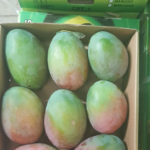 For a long time, over 60,000 small-scale farmers of Kenya mango, especially the popular ngowe variety have had to contend with a tough export market following strict requirements for fresh produce to the European Union and other Western countries. As recent as 2016, mangos in the country had one major pest, the fruit fly. The pest necessitated the use of commercial pesticides which, in turn, would lead to the cancellation of orders already en-route to their foreign destinations, due high residue content. There has been a major breakthrough, however, namely the containing of pesticides to only organic levels.
For a long time, over 60,000 small-scale farmers of Kenya mango, especially the popular ngowe variety have had to contend with a tough export market following strict requirements for fresh produce to the European Union and other Western countries. As recent as 2016, mangos in the country had one major pest, the fruit fly. The pest necessitated the use of commercial pesticides which, in turn, would lead to the cancellation of orders already en-route to their foreign destinations, due high residue content. There has been a major breakthrough, however, namely the containing of pesticides to only organic levels.
Enter bio-pesticide: this is an organic method of dealing a blow to pests such as fruit fly, using almost a similar method to lifecycle predation. In this case, pioneers, with the help of international agencies including the United States Agency for International Development (USAID) have been using a bio-pesticide known as Met 69. The ideal factor for using it is not to kill, for it is not strong enough to do so at once, but to inhibit the spread of the pests in an entire orchard.
Met 69 works just like a natural predator acts. It infects one agent, the bearer, which soon spreads the infection to the other insects it mates with until the entire populace of the disease-causing pests is annihilated in the farmyard. The main criterial for boosting the ability of this bio-pesticide is to spread it in various locales in a piece of land containing mangos and let it act in a few weeks. Sooner or later the entire farmyard will be rid of the menace.
Kenya mango farmers have rallied to the call of changing the way they maintain their crop so that it can find better acceptance abroad with such good agricultural practices. The fruit, despite its availability in most parts of the tropical world, is perennially a popular import to the Far-east, and the Western world. Originally, statistics for 2016 show that most local farmers did away with their mango produce to as high a percentage as 60 percent. This has changed now, as most of the farmers using Met 69 claim that they now do not have to contend with parting with 50 percent of their crop being under the menace of fruit fly. They now put about 95 percent of their mango harvests into the local and international markets.
The application of this bio-pesticide to the ground entails just a simple fix. Instead of spraying mangos with harmful toxins, the family grower needs to only to sprinkle a few specks of dust in special traps that will attract the fruit fly to its short-lived visitation.
Kenya mango farmers have for a long time relied on the less choosy fresh produce stalls of town and city streets, where customers are spoilt for choice. This is changing slowly in recent months. Now, the outlook is growing to ship fruits like mangos, abroad, as now there are amicable solutions to grow fruit trees without using any synthetic product that may lead to rejects.
A number of local biopharmaceutical companies are all working with international agencies to fast-track a new outlook for mango and other fruit exports. They are looking for other ways to control pests organically and making the use of such products as Met 69 universal to all family growers. This may lead to new discoveries that may mean an increase in the income of local farmers who make 70 percent of the total workforce in the country.
All in all, the use of organic pesticides not only for mango but for other crops has generated extra measures to make them work. These include:
• The use of intercropping to fix nutrients in the field and eradicate pests that emerge from monotonous crops.
• Practicing farm hygiene which constitutes frequent weeding, pruning and general maintenance.
• Monitoring pests and removing them at their onset instead of waiting until they become a pandemic is also a way out.
In short, mango farming may be on the rise not just because the export markets are opening up for local varieties but because farmers are embracing new organic means to control pests. This is reducing the pain of rejections along the supply chain, one of the major setbacks for farmers in the country.

